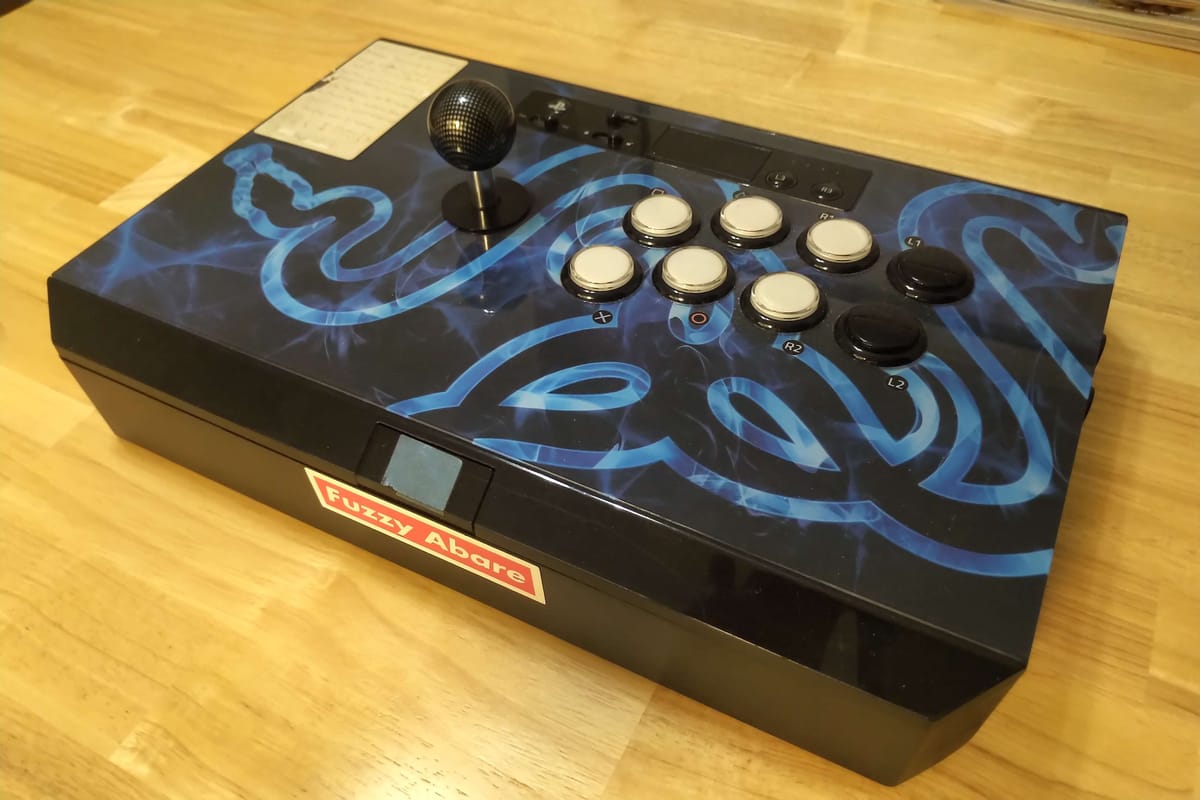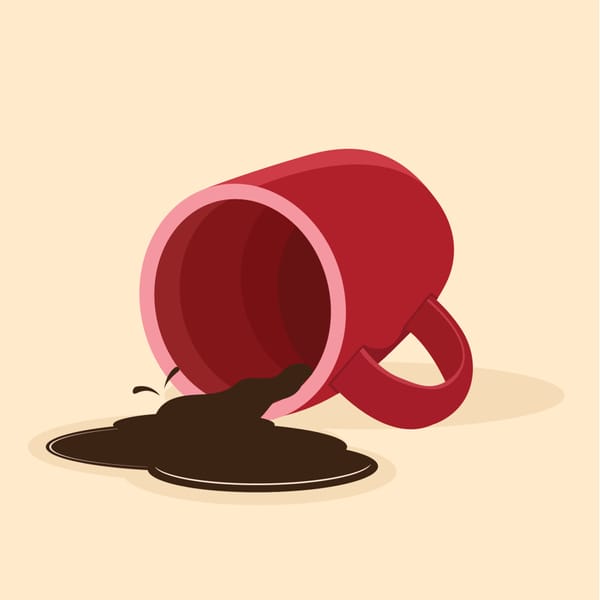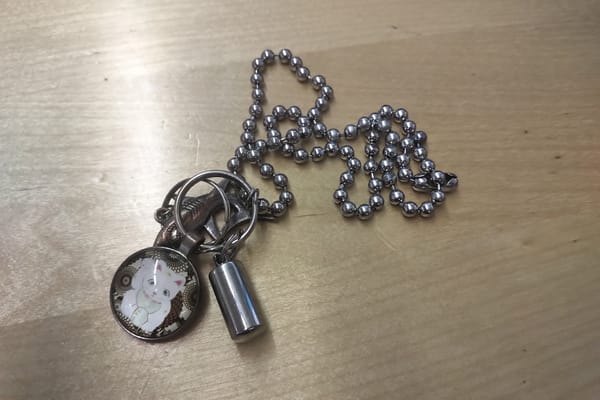How a Decade of Competition Reforms You.
How a ten year hobby equipped me to handle some not so great parts of living.

Competition presses the meek, the fear, and the doubt and hesitation out of you.
Maybe not in every moment, but it's a long-term thing. Spend enough in there, and that emotional baggage you carry in is going to get smothered out.
You enter an exhibit hall. A gymnasium. A defunct arcade. There's anywhere from a few dozen to a few thousand people. You've done this dance before. Make your way through the crowds and the scores of competitors and the funk, either the sweat of athletes or the sweat of gamers, and soon enough you're at your seat.
The anxiety in your gut never truly goes away, whether you're sitting in makeshift chairs or gearing up on a strip for a single duel or climbing up on stage where the number of eyes on you, plus the cameras and the lights, increases tenfold.
This is how winning a Major Tournament changed my perspective forever, and how even just stepping foot into the arena changes you, too.
I was a pretty meek kid. Happy and friendly at one point, apparently. The social circle of unrestrained children and mishandled embarrassment quashes that out of you.
Games were initially not my thing. I was too afraid of failing. Of being bad at something. Mom wanted me to have something to distract me on our family trip to New York, so she presented me with a Game Boy Pocket, a dull yellow color. I protested, as six-year-olds are wont to do, that I didn't want it, same as I'd said in the store when she'd asked me a week before.
Ten minutes later I've shut my trap. Engrossed in the platformer known as Toy Story. Some other game I'd never heard of called Tetris came with the package. Wasn't interested.
Nearly thirty years later, I look back at a career of multiple competitions across several fighting games, puzzle games, various sports, and dabbling in any other game that carved out that same pit of hunger into my gut as the first one. Smash Bros. Guilty Gear Accent Core. Tetris and Panel de Pon. The sports I was never the biggest on. Team ones like soccer, baseball, basketball. Fencing and lightsaber dueling I did for a while, but never liked to sit down to practice.
Unlike what's required in the workplace, on the field, I'm not a team player. I play for myself, I'm the one at fault, and the one who secures the win. All this time and that Game Boy Pocket still works with a fresh set of batteries, and I still hate the color yellow.
Back in 2019, I entered a "local" major tournament: a competition on a more national scale than when people gather with their friends for some friendly game night. I say "local", because it was an hour drive from LA to the OC, and we booked a room, and I ran into the same people I run into in my backyard, give or take a few out-of-staters and maybe someone from across the ocean who had nothing better to do that weekend.
I entered two games: Under Night In-Birth, Exe Late[st], and Guilty Gear XX: Accent Core +R. Yes, they're a mouthful. No, the names won't be on the test. Under Night is anime personified. High school kids given supernatural powers and fighting evil at night. Guilty Gear is heavy metal, post-apocalyptic, the father of modern anime fighting games, cranked up to 11. They're both cracked and a joy to learn if you have a spare decade to put aside to learn to play them masterfully.
Under Night I'd been playing for a bit over a year. Competent but not particularly proficient. I'd been matched against I don't remember who. Could have won that match but played not in any capacity I was proud enough to remember or recollect. It was the next match that was worse.
My training partner had been projected to win his match. He didn't.
So here I was sitting in the loser's bracket (in American fighting game tournaments, you've got a double-sided bracket, so losing once means you're still in the running, but losing twice means you're out). And now I'm playing the guy who I played every Wednesday. Traveled a couple counties over to lose to the same person I did in my living room.
I lost pretty spectacularly. If I'd been ten years younger it might have resulted in a thrown chair, a broken window, and an escort by security. But instead, I did something with that anger I hadn't done properly in years. Maybe ever.
I channeled that anger.
Guilty Gear, I'd been playing that for over a decade by that point. I could tell you information about that game that some people who'd been playing almost twice as long would look at you dumbfounded over. This was the first activity I'd taken part in where I'd spend fourteen hours in solitude, practicing, in a day. To be young and stupid and unemployed.
This is the point where I ask people to guess how many hours I put into that game alone. If you guessed anywhere in the magnitude of hundreds, I'd tell you that you're about 15,000 short. All of that culminated into me sitting down for any other tournament bracket.
And I was pissed. My training partner knew it. My other friends knew it. Everyone knew it. I knew it.
So, I showed it. In the game. That anger was enough to carry me to a point where once it cooled off…
"Oh hey, I'm in top 8."
Top 8 is the land of the finals. The big stage. Cameras and lights and commentators cracking jokes about your failings but screaming in excitement over your big plays. Even on this small stage of a smaller side hotel ballroom.
This is where you take the big risks.
Competition, particularly fighting games, can serve as a safe environment to experience the emotions which might otherwise destroy your career and social standing. You can get angry, disheartened, raucous, and joyful, and sobbing, and nobody who matters is going to judge you.
Approach it in a healthy manner and keep it within the game, and you're experiencing the same purpose of the drama of theater. You have a safe environment to live out the range of human emotion, from the fantastic to the ugly.
I've had all manner of people cross my path in my competitive history. From those who throw chairs to cursing up a storm to locking themselves in my bathroom and crying away.
But you keep it sane when it's all said and done. You shake hands and say, "good game". You leave the drama on the screen if you know what's good for you.
And here's where you can be the nicest, friendliest person before you sit down, and then pick up the controller and become the meanest son-of-a-bitch known to man.
So, I'm not a nice guy. Kind? I try to be. Nice? Not so much. I'm not overly focused on trying to put things as gently as possible. There's a mix of where I feel how the message needs to be delivered to some.
In the game, though? I'm a huge gambler. Give me the momentum and I'll take it and run, like a dog with that evening steak you've lovingly prepared for nobody but yourself.
There's a move across the genre of fighting games that's called the Dragon Punch, aka the Shoryuken. It comes from Ryu from Streets Fighter's rising fist of the same name. This move is designed to beat pretty much everything else. When you input it, which takes a few fractions of a second once you're proficient, your character rises from the floor in an uppercut. These moves are invincible for a short time when they begin, meaning that if you've stuck your hand into it, you're gonna eat it.
To give you an idea of how much of a risk is involved in Dragon Punching, we're going to talk a touch of frame data. I won't bore you with the esoterics since when I talk numbers, eyes glaze over like how hell freezes.
Basically, if a move gets blocked, based on the situation, it's either plus, or minus.
Plus means that the attacker still has the advantage. Even if you defended against it, it's still my turn.
Minus, on the other hand, means that I screwed up, and I gave up my turn, now it's probably yours (there's another essay of nuance in this loaded statement but for now just assume that I took a risk, and it blew up on me).
Modern FGs run at 60 FPS (or frames per second, so one frame = 1/60 of a second).
Minus 1 is usually manageable. I'm at disadvantage for throwing something out, but I'm not in a terrible place.
Minus 10 is pretty bad. I've given up my turn entirely, and if you recognize the situation as the defender, the ball's in your court.

Volcanic Viper is the name. This thing is the KING of Dragon Punches. Pressing a button against this move is sticking your fist into a running blender. Don't do it.
At best, this thing is nearly minus thirty. That's a full half-second of time to punish the damn thing.
To the laymen, that doesn't sound like a lot of time, but when you're focused, in the zone, and playing your craft, half a second is forever and a half.
I must have done this move a few dozen times in those ten minutes of playtime, up on that stage, in Top 8.
I took risks, when it was necessary, when it was unnecessary, and came out on top that day. Beat players who for years had been demons in my psyche. Ones I couldn't imagine beating when I'd stepped into that arcade a decade prior.
When you get proficient at something, you go from somebody lost, like when you first learned how to type or how to ride a bike, to prepping to become a triathlete, if you stick to it long enough, inside the game. It's become so ingrained to your muscles and perspective that you perform things that before completely flew over your head. You reach a level you couldn't conceive when you started, that others couldn't even if they tried. You become divine.
You don't even think. You just do.
That meek kid who couldn't do combos or even think about going on stages and playing? That kid's gone. Good riddance.
The emotionality though? I learned something about processing it that day. Done right, channeled right, that righteous fury, becomes an unstoppable resolution. It was enough to quiet all the self-doubt and hesitation and fear that comes in that myriad wave of decisions you have to make in the moment.
What I said at the beginning, of how competition quashes that out of you? That's if you stick around long enough and learn to deal with it. You're constantly at odds with that stupid voice in the back of your head that makes you stop for just a split second, long enough to lose.
And it's in this arena, where you must do that constantly, that you learn how to deal with it.
Until you either become the best, or you've had enough.
That crashing point is either where you quit, or where you learn how to be reborn.
You make mistakes and you keep making the same mistakes because that’s what humans do and you beat yourself up over it over and over until you start to get it right, and then you don't think about it anymore and go onto the next problem and the next cycle and it's like you've become an addict.
What then? Do you retire and move onto greener pastures? Look back fondly like high school quarterbacks and would-be superstars? Do you give back to the community instead with resources and mentorship and streaming and hosting and potential idolization? Do you keep going and work your damnedest to leave the biggest legacy imaginable for when inevitability strikes? Nothing lasts forever.
Or do you move on, but carry with you the experience forever, that not only changes how you view the world, but to a level that others who haven't stepped inside the arena may talk about as incredible but can never comprehend themselves?
After all of that, I come out from the other side scathed and battered. It's the growing pains from the arena, the same as when you come out from the gym. You're sore or tired or disappointed or all of that and then some. But it's a good feeling. The hungry ones say that the pain feels good. It wakes you up, makes you feel alive. Works like a bonding experience with others who've dived into the same pool.
You come out with some lifelong friends. Some people you might have clashed with the same way at the beginning. You hear all manner of bitter rivalries in other sports and mediums, turned water under the bridge, turned drinking buddies. Maybe you talk it over and nurture the incoming batch of new players, leaving resources and tomes of knowledge for the lost lambs. You leave a legacy large enough that your name comes up in conversation from time to time, or small enough that you played one official match and that might have been some other player's breakout moment.
But all of that grinding down, you refine yourself. All that time you spent in the arena, experiencing a wash over of emotions that might make you question your self-worth. That might bring into consideration your emotional control and how you're spending your time. "Is it worth it?" might be at the forefront.
As long as you reflect on it, you've got a powerful tool for the rest of your life.
If you can overcome the limitations you inevitably set on yourself in the beginning in here, where the competition is ferocious and the fire's always on under your ass, then doing it in other sides of your life is a walk in the park.
Workplace pressure? You can handle it. Need to learn a new career skill? You've done it before, you can do it again. Relationship tensions pulling you apart? If you can draw the parallels, you can think through it in ways that those without the experience of their backs to the wall cannot.
Regardless of how much baggage you walked into the arena with, you're not leaving with much of it, if any. The arena quashes the unnecessary out of you if you want to keep going back for more. And when you're done, you've come out tempered.
You only have to decide it: how much will you carry?
--
Addendum: Many people who have seen my stick in the cover image in person, have asked what is written on the list on the upper left.
Though faded, that list was a very important set of reminders of the proper competitive mindset:
1. Get out of your own way
2. Always transcend yourself
3. Seek victory, not escape from defeat
4. Threaten, condition, and seize in all ranges, timings, and circumstance
5. Make mistakes into miracles
6. Perform fast, perform slow
7. Don't give credit unearned
8. Become your practice
9. 強くなりたい - The Japanese phrase: "I Want to Become Stronger!"
10. Give 'em hell (a more polite rewording)
I have also included said match footage if you're interested:
Footage from the aforementioned tournament's Top 4.
This piece was written during a Write of Passage Sprint, in January, 2024. Thanks to everyone who contributed to this article's creation: Andrew Kappel, Nicole Savino, Areyla Faeron, John McBride, Nic Rosslee, Garrett Kincaid, and the entire Write of Passage Team.



